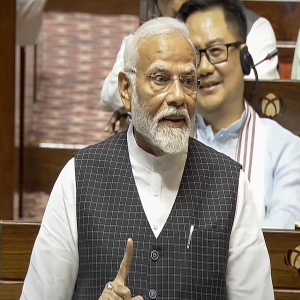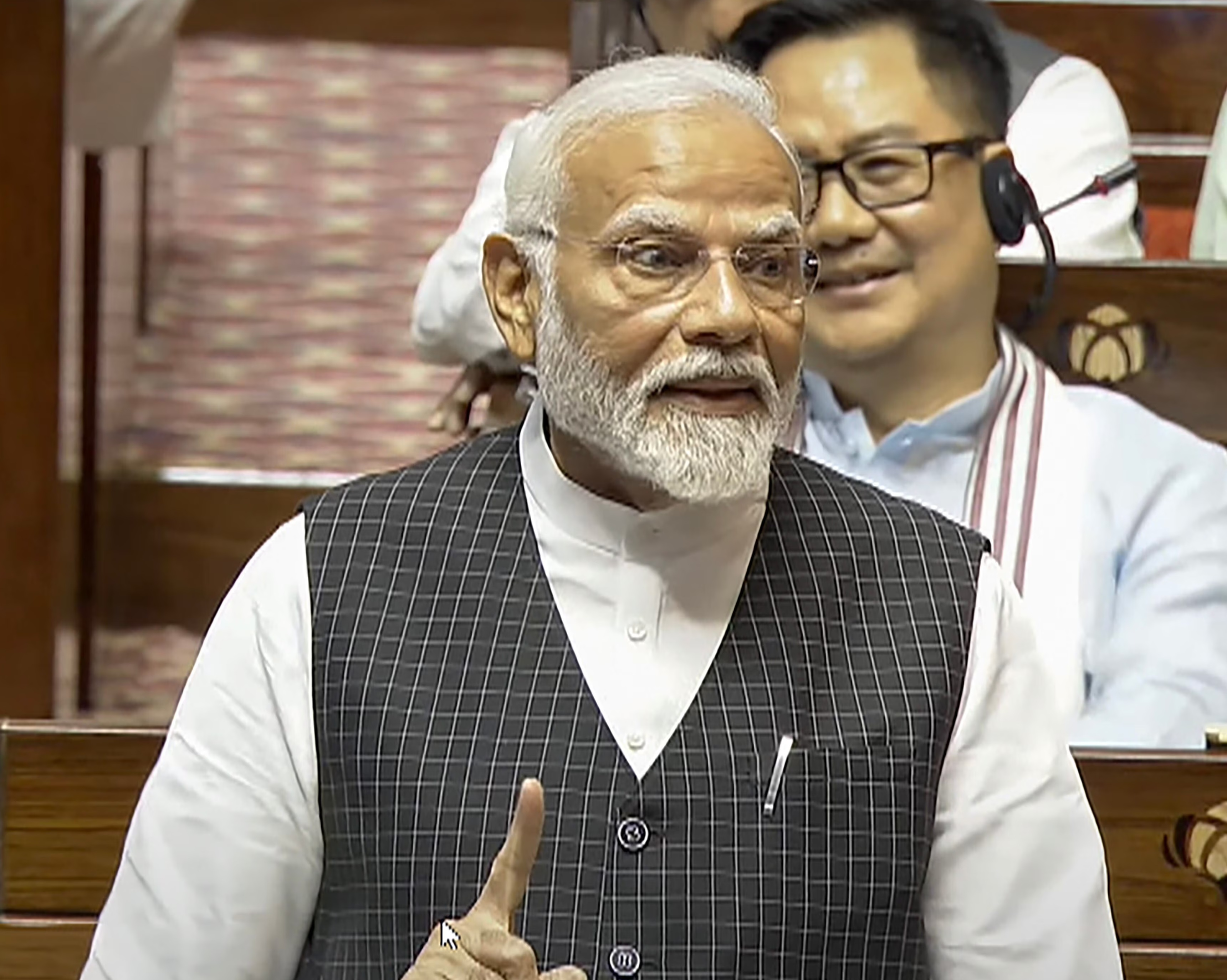
.png) Jacob Peenikaparambil
Jacob Peenikaparambil

Many post-election analyses indicated that in his third term, PM Modi could be more accommodative and consultative because of the reduced majority of the BJP and its dependence on allies for the government's survival. At the same time, some political observers held that any change in Narendra Modi's style would be extremely difficult because of his personality. In an interview with Karan Thapar for the Wire, political scientist Pratap Bhanu Mehta mentioned that "Modi may act like a wounded Tiger and he may resort to repression, coercion and communalism and the allies are not going to disturb his applecart".
According to journalist Prem Shankar Jha, "Modi's single and consistent response to any political setback throughout these years has been rage".
In his speech in the Lok Sabha on July 2, PM Modi appeared to be like a wounded tiger. His two-hour and fifteen-minute speech was characterised by bitterness, arrogance, anger, and vindictiveness. As in the past, he harped on muscular nationalism, Hindutva, and economic reforms. He branded all criticism of his government as Desh Virodhi shadyantra, or anti-national conspiracy, and vowed to nip all such conspiracies in the bud, indicating the continuity of his ruthless approach of cracking down on all protests, dissent, and criticism.
The main target of his attack was Rahul Gandhi and the Congress party. He called the Congress a "parasite" and mocked Rahul Gandhi using Gangs of Wasseypur dialogues, "balak buddhi" and "tumse na ho payega." He did not respond to the vital issues raised by Rahul Gandhi in his speech on July 1, like the continuing strife in Manipur, looming unemployment, hatred and division in society, etc.
So far, the worst form of Modi's arrogance was echoed in his statement: "Modi is still strong; his voice is still strong and his determination is strong. I want to assure all Indian people that Modi is not one to be scared and nor will be his government".
An impartial observer of the political developments after Narendra Modi took charge as Prime Minister for the third time can easily understand that the BJP and the Prime Minister's arrogance continue unabated. It would seem that Mohan Bhagwat's advice that "a true sevak is never arrogant" doesn't impact PM Modi. PM Modi might not have considered the Sangh leader's statement an indictment against him. Modi appears in his original avatar regarding his policy decisions and treatment of opposition parties and political rivals.
Senior Congress leader Mrs Sonia Gandhi wrote in an article in the Hindu, "The prime minister continues as if nothing has changed. He preaches the value of consensus but continues to value confrontation."
The first indicator of arrogance is the formation of PM Modi's council of ministers. All the key portfolios, such as Home, Defence, Finance, Foreign Affairs, Finance, etc., are with the BJP, and there has been no change in the persons heading these ministries. Amit Shah's heading of the Ministry of Home Affairs is a clear warning to the opposition party leaders and critics of the government that the investigating agencies will continue to haunt them.
Refusal to give up the Deputy Speaker's post and the election of Om Birla as the Speaker of Lok Sabha is another clear signal that the opposition will not be given time and space to express their views and make the government accountable. The three criminal laws were passed by the Lok Sabha when more than 90 opposition party members were suspended by the then-speaker Om Birla. The functioning of Om Birla as the speaker during his first term doesn't inspire trust in the opposition party MPs that justice will be done to them. Expunging a substantial part of Rahul Gandhi's speech in the Lok Sabha on July 1 is clear proof of the continued bias of the Lok Sabha Speaker against the opposition.
Despite strong reminders to the speaker by the opposition party leaders in their congratulatory messages to be impartial, soon after his election, Om Birla on Wednesday, June 26, set off a firestorm by reading out a resolution condemning the imposition of Emergency as an attack on the Constitution by the then Prime Minister Indira Gandhi. After the Speaker, President Murmu Highlighted the Emergency in a Joint Address to Both Houses of Parliament. In her first address to the 18th Lok Sabha, President Droupadi Murmu said the Emergency was 'the biggest and darkest chapter of direct attack on the Constitution'.
These two unwarranted statements are clear signs of a confrontational approach of the Modi government towards the opposition rather than cooperation. The Congress party had already accepted that the declaration of Emergency in 1975 was a great mistake. Dragging the issue after almost 50 years is nothing but a diversionary tactic by the Modi government. Regarding the Emergency, Sonia Gandhi, in her article in the Hindu, wrote, "It is a fact of history that in March 1977 the people of India gave a categorical verdict on Emergency which was accepted unhesitatingly and unequivocally".
The move to prosecute globally known writer and activist Arundhati Roy under the UAPA is a stern warning to writers, journalists and social activists that no criticism of the government will be tolerated. On June 14, Delhi Lieutenant Governor VK Saxena granted sanction to prosecute Arundhati Roy and Kashmir-based academic Sheikh Showkat Hussain under the Unlawful Activities (Prevention) Act (UAPA) for a remark allegedly made by Roy at a seminar in New Delhi in 2010. Human Rights Organisation People's Union for Civil Liberties (PUCL) has demanded the withdrawal of the permission, stating that LG's actions are "politically motivated, patently unconscionable and vindictive". A top United Nations human rights official on Thursday, June 26, voiced concern over the use of anti-terror law in India to silence critics and urged authorities to drop cases against author Arundhati Roy over comments on Kashmir.
A Delhi court sentencing social activist Medha Patkar to five months simple imprisonment in a 24-year-old defamation suit against her by VK Saxena, who is now the Lieutenant Governor of Delhi, could be seen from the perspective of the resurgence of arrogance and vindictiveness of the rulers.
The arrest of Delhi Chief Minister Arvind Kejriwal by the CBI in a liquor license case on June 26 sends a strong message to the political opponents of PM Modi. Kejriwal is already in jail in a case filed by the Enforcement Directorate (ED) related to liquor licensing. The arrest by the CBI was made hours before the Supreme Court heard his plea against Delhi High Court's stay on bail. The purpose of the arrest is to make it possible for Kejriwal to be kept behind bars irrespective of what the Supreme Court says on bail in the Enforcement Directorate's case against him on the same excise policy issue. Even after the rebuff to the BJP in the recently concluded Lok Sabha elections, there is no let-up in using the investigation agencies to target political opponents and critics of the Modi government.
The arrogance of the BJP and PM Modi is reflected in their reluctance to accept their failures. PM Modi resumed his Man ki Baat on Sunday, June 30. He didn't mention the paper leak in the NEET exam and the suffering caused to lakhs of aspiring young people, violence in Manipur, collapse of the roofs of airports and bridges, train accident in West Bengal and waterlogging, road cave-ins on Ram Path in Ayodhya exposition of corruption and inefficiency in governance. PM Modi was eloquently silent on these issues.
The minorities in India should not expect that attacks from right-wing extremist groups will stop. Mohan Charan Majhi, who is made the chief minister of Odisha, had been campaigning for the release of Dara Singh, serving life for the gruesome murder of missionary Graham Stain and his two sons. Communal violence broke out in the coastal town of Balasore in Odisha on June 17. After the elections were over, attacks on minorities started with increasing vigour in different parts of India.
A Muslim man was killed by a group of cow vigilantes when he was transporting buffaloes in Gujarat's Banaskantha district on Thursday, May 23, reported The Indian Express. Two Muslim men, Chand Miya and Guddu Khan, were fatally attacked in Raipur by cow vigilantes while transporting buffaloes in a truck. Their bodies were found in the Mahanadi River.
UCA News on June 26 reported that a protestant pastor and his wife, along with 11 Christians, were jailed in separate incidents in Uttar Pradesh over allegations of religious conversion. The pastor and his wife, who are parents of three children, were arrested in Azamgarh in UP on June 21 by police in Uttar Pradesh.
PM Modi's speech on July 1 in the Parliament chastising the opposition, accusing the Congress of many unfounded allegations and mocking Rahul Gandhi, who had challenged Modi, the BJP and RSS in his speech as the leader of the opposition on the previous day, is in a way the climax of the arrogance PM Modi and his party. One has to watch and see the next step of the wounded tiger.
Despite the arrogance and obstinacy of the BJP and the PM, the opposition, particularly the Congress, has become courageous in standing for the Constitution and its values by confronting the Hindutva forces. Rahul Gandhi's speech in the Lok Sabha on July 1 is proof of this transformation. "All our great leaders have advocated for non-violence and ending fear. However, those who claim to be Hindu only speak of violence, hatred, and untruth. You are not truly Hindu," Rahul Gandhi accused the BJP, RSS and Modi. Rahul unambiguously told Modi that RSS, BJP and Modi do not represent the whole Hindu community.
During his speech in Rajya Sabha on July 1, Congress president Mallikarjun Karghe showed the guts to take on the RSS. He stated that all of the country's institutions had been captured by "one organisation," adding that the RSS and the BJP had destroyed the country's institutions.
To defeat the BJP's arrogance and autocracy, people are to be mobilised through innovative programmes like Bharat Jodo Yatra. They should also hold the government accountable in Parliament by questioning and opposing wrong policies.